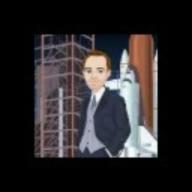Could a new big bang take place after the universe's eventual heat death?
2017-06-09 11:26 pm
回答 (10)
2017-06-11 9:57 pm
✔ 最佳答案
Cyclical Universe theory is an acceptable one so yes.
2017-06-09 11:35 pm
Two thoughts on this...
Back in the olden days (like 1989), it was thought the 'Big Crunch' may be possible - the expansion would eventually stop due to the gravitational pull of the mass within our universe, fall back together, and somehow trigger a *new* Big Bang...
Since then - with the discovery that the expansion is speeding up, this is looking far less likely to happen.
With the Heat Death of the universe - that is, everything expands until no new stars can be formed, and eventually, all the stars die, leaving behind a cold, expanding universe - a new "Big Bang" isn't likely either.... at least, not in *this* universe.
That being said, it's not impossible, either. It's possible our Big Bang occurred in one part of our universe - and another may have occurred outside the visible universe - that is, the light from that event has had time to travel to us yet. Right now - we don't know if that's even possible... so - we can't say that it's *impossible* either.
Studies continue...
Back in the olden days (like 1989), it was thought the 'Big Crunch' may be possible - the expansion would eventually stop due to the gravitational pull of the mass within our universe, fall back together, and somehow trigger a *new* Big Bang...
Since then - with the discovery that the expansion is speeding up, this is looking far less likely to happen.
With the Heat Death of the universe - that is, everything expands until no new stars can be formed, and eventually, all the stars die, leaving behind a cold, expanding universe - a new "Big Bang" isn't likely either.... at least, not in *this* universe.
That being said, it's not impossible, either. It's possible our Big Bang occurred in one part of our universe - and another may have occurred outside the visible universe - that is, the light from that event has had time to travel to us yet. Right now - we don't know if that's even possible... so - we can't say that it's *impossible* either.
Studies continue...
2017-06-12 11:51 am
NO, not feasible. Mike
參考: Simple Logic
2017-06-10 2:02 pm
If you believe that the universe started with a quantum vacuum fluctuation, then the answer is yes. Heat death is state of maximum entropy. But, entropy has a statistical side - order can come from disorder with an incredibly low, but finite probability. Assuming an infinite continuation of time, and that vacuum fluctuations can start a universe, then there will always be a probability that a vacuum fluctuation could create a state of low entropy required for the initial conditions of a new universe.
2017-06-10 10:45 am
Now you are just being silly.
Cheers!
Cheers!
2017-06-09 11:44 pm
Who knows. There are constant changes in what is being discovered and the resulting changes in predictions by scientists. Anyone who says they know the answer to your question is just guessing. It may be a very educated guess but nevertheless a guess.
Relax and worry about something closer to real time.
Relax and worry about something closer to real time.
2017-06-09 11:28 pm
No
2017-06-10 4:49 am
IF it ends in heat death, no.
The only way a new Big Bang could form is if the universe ended in a Big Crunch scenario.
The only way a new Big Bang could form is if the universe ended in a Big Crunch scenario.
2017-06-10 1:44 am
We know nothing about the requirements for the origin of a Big Bang.
Possibly one could happen right here right now, as far as we know.
Possibly one could happen right here right now, as far as we know.
2017-06-09 11:49 pm
If a Super-Massive Black Hole were to explode, which is believed possible due to Hawking radiation leakage, it could have the effect of a new Big Bang of a much smaller universe
收錄日期: 2021-04-24 00:28:32
原文連結 [永久失效]:
https://hk.answers.yahoo.com/question/index?qid=20170609152659AA31NfL


